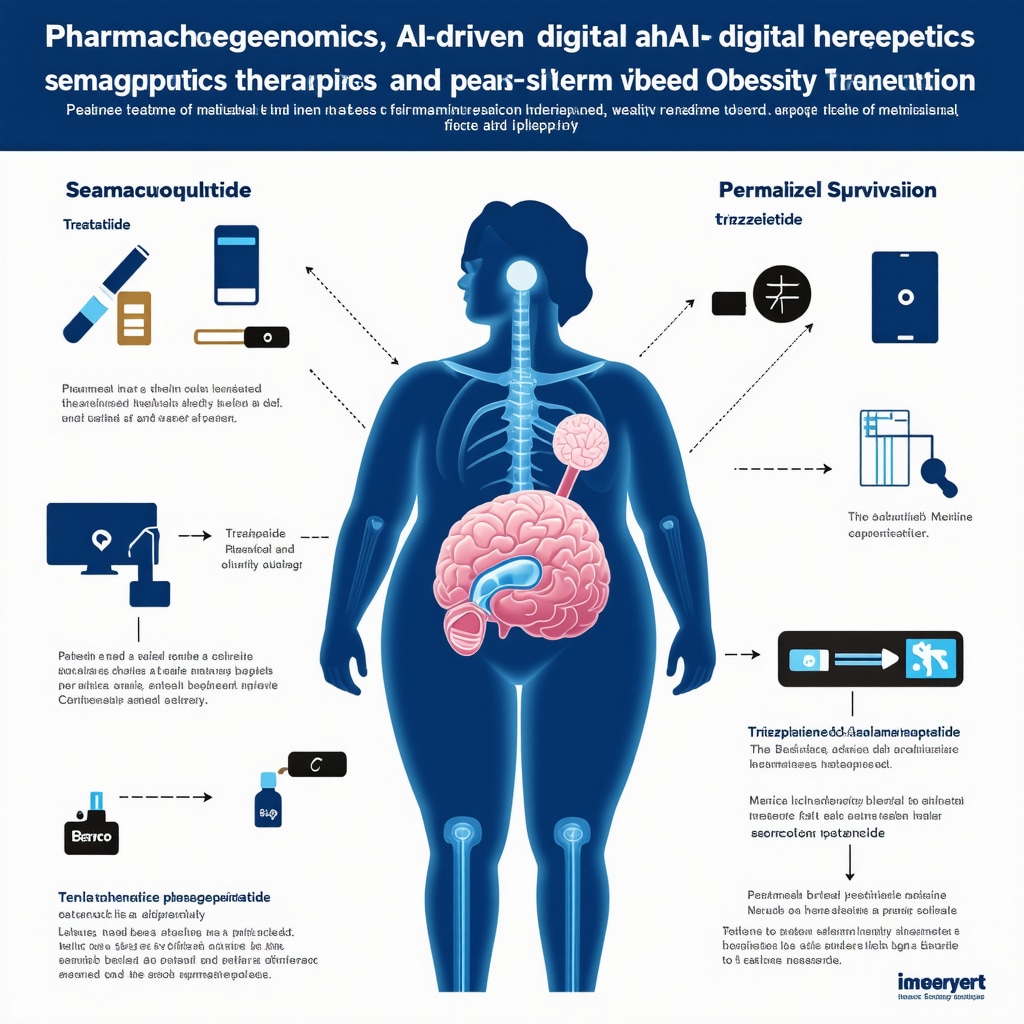Unlocking the Secrets of Safe Weight Loss: Why Legal Prescription Drugs Are the New Heavyweights
Imagine standing at the crossroads of weight loss, faced with a dizzying array of options—from fad diets to miracle pills promising overnight transformation. Yet, the true champions in this battle against obesity are the top legal weight loss drugs for treating obesity safely, prescribed under the watchful eyes of medical experts. These aren’t just any pills; they’re scientifically backed, FDA-approved medications that bring hope without the horror stories.
Why Trust Legal Weight Loss Medications? Spoiler: It’s Not Just About Shedding Pounds
In the vast landscape of weight loss, safety is king. Legal weight loss drugs don’t just focus on the scale; they address underlying metabolic issues and appetite regulation. Drugs like semaglutide and tirzepatide have revolutionized treatment by mimicking hormones that control hunger, leading to sustained fat loss. And the best part? These medications come with rigorous clinical trials ensuring their efficacy and safety profile, a far cry from unregulated supplements lurking in the shadows.
Is It Really Possible to Lose Weight Without Compromising Your Health?
Absolutely. But the secret lies in pairing these medications with personalized, doctor-prescribed weight loss plans tailored to your unique physiology. It’s not about quick fixes; it’s about sustainable health improvements. For those curious about how to get started, exploring doctor-led fat loss plans offers a glimpse into medically supervised paths that maximize benefits while minimizing risks.
The Powerhouses You Should Know: Semaglutide and Tirzepatide Take the Stage
Among the legal options, semaglutide and tirzepatide have gained headlines—and for good reason. Semaglutide, originally developed for diabetes, has shown remarkable weight loss effects by regulating appetite and glucose metabolism. Tirzepatide, a newer contender, combines dual hormone action for even more potent results. Curious about how they stack up? Dive into the ultimate weight loss showdown that pits these two against each other with expert insights and real patient outcomes.
According to a 2021 New England Journal of Medicine study, semaglutide users experienced an average 15% body weight reduction over 68 weeks, showcasing the impressive potential of these medications when integrated into a comprehensive treatment plan.
Ready to Take the Leap? How to Navigate Your Weight Loss Journey Safely
Embarking on this journey means partnering with healthcare professionals who understand your story and goals. Not all weight loss drugs are suitable for everyone, and a proper medical evaluation is crucial. If you’re eager to explore the safest and most effective prescription drugs available, check out how to choose the best legal weight loss drugs to tailor your approach.
Have you tried legal weight loss medications or considered them as part of your health strategy? Share your experiences or questions below—let’s create a conversation that empowers everyone to make informed, safe choices on their path to wellness.
Diving Deeper Into Prescription Weight Loss: Beyond the Basics
While semaglutide and tirzepatide have reshaped the weight loss landscape, understanding the nuances of these medications is key to harnessing their full potential. These drugs do not work in isolation; their effectiveness is amplified when integrated within a comprehensive, personalized medical weight loss program. This approach often includes nutritional guidance, behavioral therapy, and physical activity recommendations, all tailored to the individual’s metabolic profile and lifestyle constraints. Such customization enhances adherence and optimizes outcomes, underscoring the importance of doctor-prescribed weight loss plans that fit your lifestyle and health goals.
Medical Oversight: The Pillar of Safe and Effective Weight Loss
Unsupervised use of weight loss medications can lead to unintended consequences. Medical supervision ensures that potential side effects are monitored and managed, dosages are appropriately adjusted, and therapy is discontinued or changed if necessary. Furthermore, regular follow-up appointments allow for the assessment of progress and adjustments to the treatment regimen, which are crucial in sustaining long-term success. Resources like the doctor-prescribed weight loss plans that fit your lifestyle provide detailed insights on how to navigate this process effectively.
How Does Personalized Medicine Shape the Future of Weight Loss Treatments?
Personalized medicine is revolutionizing obesity treatment by considering genetic, environmental, and lifestyle factors that influence drug response. For instance, pharmacogenomic testing can predict how a patient metabolizes certain medications, allowing physicians to select the most effective and safest weight loss drug for each individual. This paradigm shift not only maximizes efficacy but also minimizes adverse effects, setting a new standard for obesity care. The integration of telemedicine in this field further expands access to personalized care, enabling patients to receive expert guidance remotely, as highlighted in the telemedicine weight loss treatment improves access in 2025 review.
Balancing Efficacy and Safety: What Does Current Research Say?
Recent clinical trials continue to validate the safety profiles of these FDA-approved drugs, but continuous vigilance remains essential. According to the National Institutes of Health report on weight loss pharmacotherapy, long-term studies demonstrate that when combined with lifestyle modifications, medications like semaglutide significantly reduce cardiovascular risk factors, improve glycemic control, and promote sustained weight loss. However, physicians emphasize that these benefits are contingent upon ongoing patient engagement and comprehensive care strategies.
If you found these insights valuable, consider sharing this article to inform others who might benefit from understanding the complexities of prescription weight loss drugs. Your comments and experiences also help enrich the conversation—what challenges or successes have you encountered on your weight loss journey?
Decoding the Pharmacodynamics: How Semaglutide and Tirzepatide Orchestrate Metabolic Harmony
Understanding the intricate mechanisms behind semaglutide and tirzepatide reveals why these agents stand apart in the obesity treatment arsenal. Semaglutide functions primarily as a GLP-1 receptor agonist, enhancing insulin secretion, suppressing glucagon release, and slowing gastric emptying—culminating in reduced appetite and improved glycemic control. Tirzepatide, on the other hand, is a dual agonist targeting both GLP-1 and GIP receptors, which amplifies its effect on insulin sensitivity and satiety signals. This duality not only fosters greater weight loss but also optimizes metabolic parameters beyond what traditional monotherapies achieve.
What Are the Implications of Combining Dual-Incretin Therapies for Long-Term Metabolic Health?
The advent of dual-incretin therapies like tirzepatide signifies a paradigm shift, but their long-term impact on metabolic health remains an active area of research. Early data suggest enhanced beta-cell preservation and improved lipid profiles, potentially mitigating risks associated with type 2 diabetes and cardiovascular disease. However, clinicians must weigh these benefits against possible gastrointestinal adverse effects and the need for individualized dosing regimens. As these therapies mature through phase IV post-marketing surveillance, ongoing vigilance is imperative to tailor treatments that harmonize efficacy with patient tolerability.
Emerging research from ScienceDirect highlights molecular interactions underpinning incretin receptor co-activation, offering promising avenues for next-generation weight loss drugs.
Integrating Pharmacogenomics: The Future Blueprint for Tailored Obesity Management
Pharmacogenomics is rapidly becoming indispensable in refining weight loss drug prescriptions. Variations in genes encoding for drug-metabolizing enzymes, hormone receptors, and neurotransmitter pathways can dramatically alter therapeutic outcomes. For example, polymorphisms influencing GLP-1 receptor sensitivity may dictate responsiveness to semaglutide, guiding dosage adjustments or alternative drug selection. Incorporating genetic screening into clinical workflows enables a precision medicine approach, minimizing trial-and-error phases and reducing exposure to ineffective treatments.
Moreover, integrating real-world data analytics with genomic information empowers clinicians to predict adverse event risks proactively, ensuring safer long-term management plans. This synthesis of molecular biology and data science heralds an era where obesity treatment transcends one-size-fits-all modalities.
Leveraging Digital Therapeutics and AI-Driven Monitoring to Augment Prescription Weight Loss Efficacy
The synergistic combination of prescription drugs with digital health interventions is revolutionizing patient adherence and outcome monitoring. AI-powered platforms provide personalized coaching, meal planning, and behavioral nudges that align with pharmacotherapy timelines, enhancing lifestyle modifications critical to sustained weight loss. Continuous glucose monitoring and wearable devices offer real-time feedback loops, allowing clinicians to fine-tune medication dosages and behavioral strategies dynamically.
Such integrations not only improve clinical outcomes but also empower patients with actionable insights, fostering a collaborative care model. The future landscape envisions seamless interoperability between pharmacological treatments and digital ecosystems, creating holistic obesity management pathways.

Unpacking Complex Side Effect Profiles: Navigating Gastrointestinal and Cardiovascular Considerations
While semaglutide and tirzepatide boast impressive efficacy, understanding their side effect spectra is crucial for safe administration. Gastrointestinal symptoms such as nausea, vomiting, and diarrhea are common but often transient. More critically, recent studies emphasize evaluating cardiovascular impacts, particularly in patients with pre-existing heart conditions. The European Heart Journal published nuanced analyses indicating that while these drugs generally exhibit cardioprotective effects, vigilant patient selection and monitoring remain paramount to mitigate rare adverse events.
Clinicians must balance therapeutic gains against potential risks through comprehensive risk stratification protocols, informed consent discussions, and personalized follow-up schedules.
Ready to Elevate Your Weight Loss Strategy? Engage with Expert-Guided Medical Plans Today
As the science of obesity treatment advances, partnering with healthcare professionals who integrate pharmacotherapy, genetics, and digital tools is your gateway to achieving sustainable results. Explore detailed, expert-led weight loss plans that leverage these innovations at LossWeight4All and turn cutting-edge research into your personal health triumph.
Embracing Personalized Medicine: Tailoring Weight Loss Drugs to Your Unique Genetic Makeup
In the evolving landscape of obesity treatment, one size no longer fits all. The integration of pharmacogenomics into weight loss medication protocols is an exciting frontier, empowering physicians to customize prescriptions based on an individual’s genetic profile. By understanding variations in genes that influence drug metabolism and receptor sensitivity, clinicians can optimize dosages and select agents like semaglutide or tirzepatide with enhanced precision, minimizing adverse effects and maximizing efficacy. This tailored approach transforms weight management from a generalized regimen into a bespoke therapeutic journey, aligning with the principles of precision medicine.
How Does Genetic Variability Influence Patient Response to GLP-1 and Dual-Agonist Therapies?
Genetic polymorphisms impacting GLP-1 receptor expression or downstream signaling pathways can significantly modulate a patient’s responsiveness to therapies such as semaglutide and tirzepatide. For example, variations in the GLP1R gene may alter receptor affinity or density, affecting appetite suppression and glycemic control. Similarly, differences in enzymes responsible for drug metabolism can influence plasma drug levels, necessitating adjustments in dosing schedules. Recent findings published in Pharmacogenomics Journal underscore the critical role of integrating genetic screening in clinical decision-making for weight loss pharmacotherapy, heralding a new era of personalized obesity care.
Digital Therapeutics: The Next-Level Companion to Prescription Weight Loss Medications
Beyond the biochemical mechanisms, the success of weight loss medications is increasingly linked to behavioral and lifestyle modifications facilitated by digital health solutions. AI-driven apps provide continuous, personalized support—delivering meal plans, exercise guidance, and motivational nudges synchronized with pharmacotherapy timelines. This real-time monitoring and adaptive feedback loop enhance patient adherence and engagement, crucial factors in long-term weight loss maintenance.
Wearable devices integrated with AI platforms track physiological markers such as glucose levels and activity patterns, enabling clinicians to dynamically tailor treatment plans. This synergy between prescription drugs and digital therapeutics creates a comprehensive, patient-centered ecosystem that transcends traditional weight loss paradigms.
Mitigating Complex Side Effects: Expert Strategies for Managing Gastrointestinal and Cardiovascular Risks
While semaglutide and tirzepatide offer unprecedented benefits, navigating their side effect profiles requires sophisticated clinical oversight. Gastrointestinal disturbances—nausea, vomiting, and diarrhea—are frequent, often diminishing with dose titration and patient acclimatization. Cardiovascular considerations, especially in patients with underlying heart disease, mandate vigilant screening and individualized risk assessment.
The European Heart Journal highlights that although these medications generally demonstrate cardioprotective effects, rare adverse events necessitate comprehensive monitoring protocols. Multidisciplinary teams, including cardiologists and endocrinologists, collaborate to balance therapeutic gains against potential risks, ensuring patient safety remains paramount.
How Can Integrative Care Models Enhance Safety and Efficacy in Prescription Weight Loss Therapy?
Integrative care models that combine medical, behavioral, and technological resources provide the scaffolding for successful obesity treatment. Regular follow-ups, genetic insights, and digital engagement converge to create adaptive treatment plans responsive to individual progress and tolerance. Proactive side effect management, patient education, and psychological support further cement adherence and optimize health outcomes. Exploring doctor-led fat loss plans illustrates how such comprehensive strategies are deployed in clinical practice to deliver sustainable results.
If you’re navigating the complex world of prescription weight loss medications, share your experiences or questions below. Your insights can empower others and enrich this ongoing conversation about safe, effective obesity treatment.

Expert Insights & Advanced Considerations
Precision Pharmacogenomics is Reshaping Weight Loss Drug Efficacy
The integration of pharmacogenomic profiling into obesity treatment protocols is no longer theoretical but a practical tool influencing drug selection, dosing, and side effect management. By decoding genetic variants affecting GLP-1 receptor sensitivity and drug metabolism enzymes, clinicians can tailor therapies like semaglutide and tirzepatide with unparalleled accuracy, enhancing both safety and outcomes. This bespoke approach marks a decisive shift from one-size-fits-all to precision medicine in obesity care.
Dual-Incretin Therapies Offer Metabolic Benefits Beyond Weight Loss
Tirzepatide’s dual agonism of GLP-1 and GIP receptors presents a multifaceted metabolic modulation, improving insulin sensitivity and beta-cell function. Early longitudinal studies suggest this may translate into durable cardiovascular risk reduction and diabetes prevention. However, balancing enhanced efficacy with tolerability demands vigilant monitoring and individualized dosing protocols to optimize patient adherence and safety.
Digital Therapeutics Amplify Pharmacotherapy Success Through Behavioral Synchronization
AI-driven digital health platforms are emerging as critical adjuncts, delivering real-time lifestyle interventions that synchronize with pharmacologic treatment schedules. These technologies facilitate adaptive meal planning, exercise encouragement, and side effect management, thereby addressing the behavioral dimensions of weight loss. The convergence of pharmacotherapy and digital therapeutics fosters a holistic, patient-centered model that maximizes long-term sustainability.
Comprehensive Medical Oversight is Essential to Navigate Complex Side Effect Profiles
Gastrointestinal side effects and cardiovascular considerations require nuanced clinical vigilance. Multidisciplinary care teams, including endocrinologists and cardiologists, utilize stratified risk assessments and titration strategies to mitigate adverse events. Such integrative care models enhance patient safety and therapeutic efficacy, underscoring the indispensable role of medical supervision in prescription weight loss therapies.
Curated Expert Resources
New England Journal of Medicine (NEJM): Offers seminal peer-reviewed clinical trial results on semaglutide and tirzepatide efficacy and safety, essential for evidence-based prescribing.
European Heart Journal: Provides critical analyses on cardiovascular outcomes associated with incretin-based therapies, informing risk stratification and monitoring protocols.
Pharmacogenomics Journal: Delivers in-depth research on genetic determinants of drug response, supporting personalized medicine applications in obesity treatment.
ScienceDirect Molecular Pharmacology Reviews: Explores molecular mechanisms of dual-incretin receptor co-activation, guiding the development of next-generation therapeutics.
LossWeight4All Doctor-Led Fat Loss Plans: A practical, expert-curated portal offering medically supervised, personalized weight loss regimens integrating pharmacotherapy and lifestyle modifications (explore plans).
Final Expert Perspective
Legal prescription weight loss drugs for obesity are at the forefront of a transformative era in metabolic health management. The convergence of pharmacogenomics, dual-incretin therapies, and digital therapeutics heralds an unprecedented capacity to tailor treatments that maximize efficacy while safeguarding patient safety. This sophisticated landscape demands not only scientific rigor but also a compassionate, integrative clinical approach that empowers patients to achieve sustainable results. For those ready to engage deeply with this evolving paradigm, exploring doctor-led fat loss plans offers a gateway to expert-guided, personalized strategies. Your journey toward informed, safe, and effective obesity treatment begins with knowledge and collaboration—join the conversation, share your insights, and elevate your weight loss strategy today.

This post really highlights the importance of medically supervised weight loss strategies—especially with powerful drugs like semaglutide and tirzepatide now available. In my own journey, working closely with a healthcare provider made all the difference, ensuring I monitored side effects and kept my plan safe and sustainable. I’ve found that combining these medications with dietary changes and exercise enhances results, but without proper oversight, risks can increase. It made me curious about the role of pharmacogenomics—do you think more clinics will adopt genetic testing routinely to personalize treatments? I believe integrating genetic insights could truly revolutionize how we approach obesity management, minimizing adverse effects and maximizing success. Have others experienced personalized medicine making a real impact in their weight loss efforts? Would love to hear different approaches and outcomes.